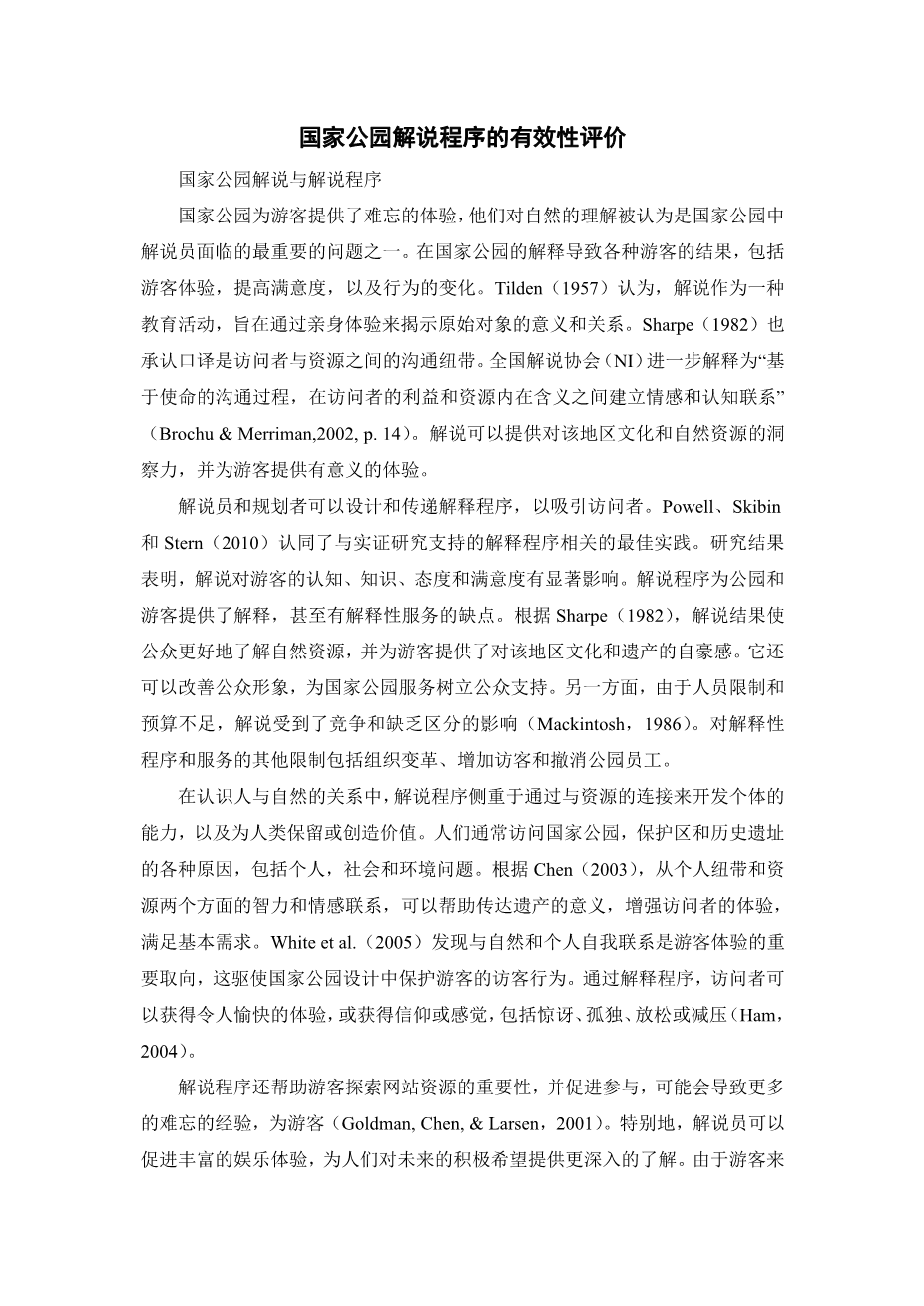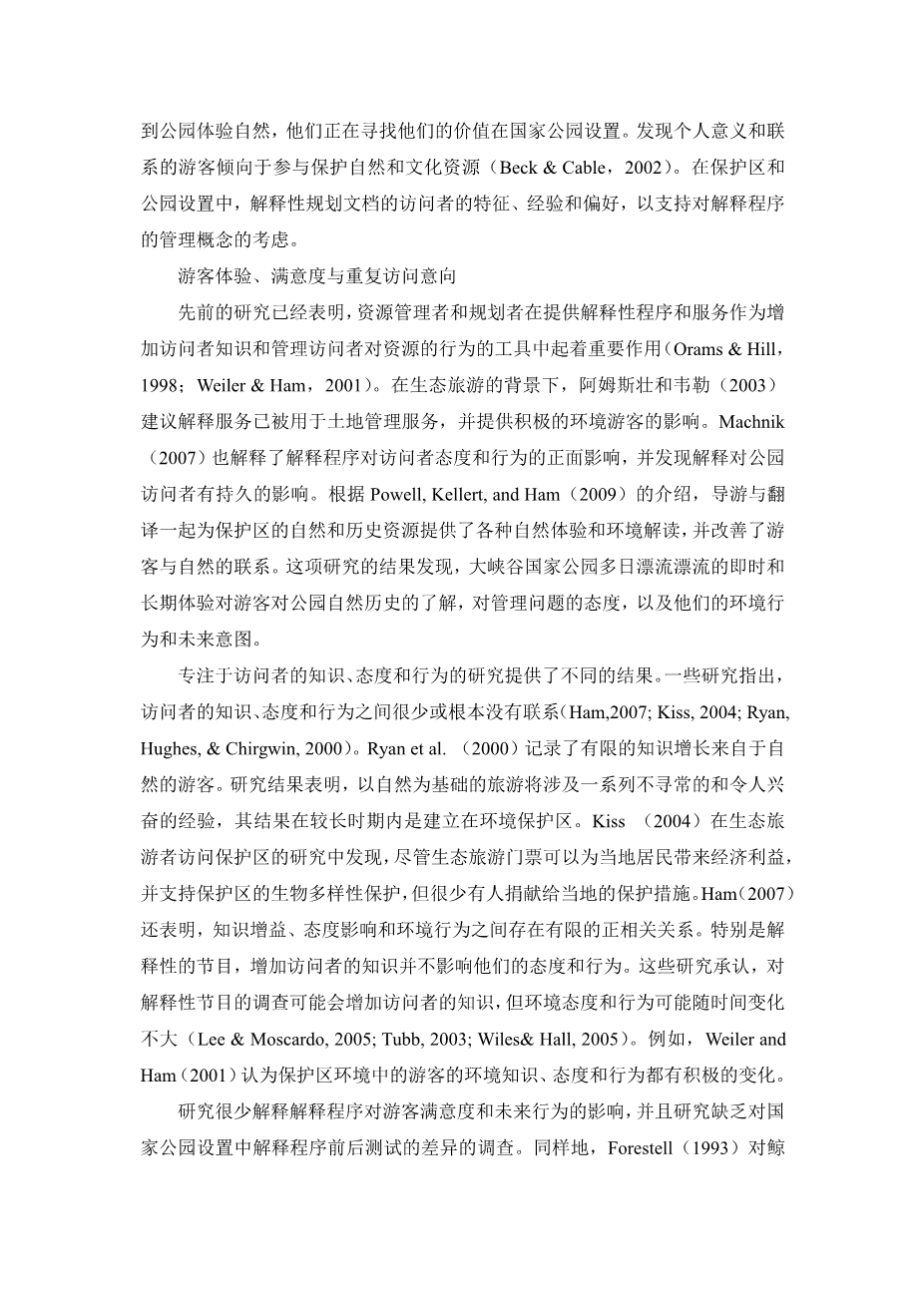The evaluation of effectiveness of the interpretive program at national parks
Interpretation and interpretive programs in national parks
National parks provide memorable experiences for visitors, and their understanding of nature is considered to be one of the most important issues facing interpreters at national parks. Interpretation in national parks result in a variety of visitor outcomes, including visitor experience, improved satisfaction, and behavior change. According to Tilden (1957), interpretation is defined as an educational activity which aims to reveal meaning and relationships through the original objects by firsthand experience. Sharpe (1982) also acknowledged that interpretation is the communication link between the visitor and the resources. The National Association for Interpretation (NAI) further defined interpretation as “a mission-based communication process that forges emotional and cognitive connections between the interests of the visitor and the meanings inherent in the resource” (Brochu amp; Merriman,2002, p. 14). Interpretation can offer insight into the cultural and natural resources of the area, and provide the visitor with meaningful experiences.
Interpreters and planners can design and deliver interpretive programs in a way that engages visitors. Powell, Skibins, and Stern (2010) identified best practices associated with the interpretive programs supported by empirical research. Results of this study indicated that interpretation had a significant impact on visitors’ awareness, knowl-
edge, attitudes, and satisfaction. The interpretive program provides benefits for the park and the visitors even with shortcomings with interpretive services. According to Sharpe (1982), interpretation results in the public better understanding natural resources, and provides visitors with a sense of pride in the region's culture and heritage. It may also improve the public image and establish public support for the
National Park Service. On the other hand, interpretation suffers from the competition and lack of differentiation between programs due to personnel restrictions and inadequate budgets (Mackintosh, 1986).Other constraints for interpretive programs and services include organizational changes, increased visitors, and removing park personnel.
In recognition of connecting people with nature, the interpretive program focuses on developing individuals’capabilities through connecting with the resources as well as preserving or creating value in nature for the benefit to humankind. People generally visit national parks, protected areas, and historical sites for a variety of reasons, including personal, social, and environmental issues. According to Chen(2003), both intellectual and emotional connections from personal bonds with resources which can help communicate meanings of heritages, enhance visitors’experiences, and satisfy basic needs. White et al. (2005) found that connecting with nature and personal self-re-flection were important orientations of visitor experiences, which drive visitor behavior at national park settings designed to protect the sites. Through the interpretive programs, visitors can achieve an enjoyable experience, or acquisition of a belief or feeling, including astonishment, solitude, relaxation, or stress relief (Ham, 2004).
The interpretive program also helps visitors to explore the importance of site resources, and to facilitate engagement that may result in more memorable experiences for visitors (Goldman, Chen, amp; Larsen,2001). Specifically, interpreters can promote enriched recreational experiences that provide enhanced understanding of one's place in the positive hope for the future. Since visitors come to the parks to experience nature, they are looking for something they value in a national park setting. Visitors who discover personal meaning and connection would be inclined to participate in preserving natural and cultural resources (Beck amp; Cable, 2002). In protected areas and park settings, interpretive planning document visitors’characteristics, experiences, and preferences to support the consideration of management concepts for the interpretive program.
Visitor experience, satisfaction, and repeat visit intention
Previous research has suggested that resource managers and planners play an important role in providing interpretive programs and services as a tool for increasing visitor knowledge and managing visitor behaviors towards resources (Orams amp; Hill, 1998; Weiler amp; Ham,2001). Within the context of ecotourism, Armstrong and Weiler (2003) suggested that interpretive services have been used for land management services and providing positive environmental visitor impacts. Machnik (2007) also identified which interpretive programs positively affected visitors’attitudes and actions, and found that the interpretation had lasting effects on park visitors. According to Powell, Kellert, and Ham (2009), tours with an interpreter offer various natural experiences and environmental interpretation of the protected area's natural and historical resources, and improve visitors’connection with nature. Results from this study found the immediate and long-term influence of the Grand Canyon National Park multi-day whitewater rafting experiences on visitors’knowledge of the park's natural history, attitudes toward the management issues, and their environmental behaviors and future intentions.
Research focusing on visitor knowledge, attitudes, and behaviors has provided mixed results. Some studies have noted little or no linkages between visitors’knowledge, attitudes, and behaviors (Ham,2007; Kiss, 2004; Ryan, Hughes, amp; Chirgwin, 2000). Ryan et al. (2000) documented that limited increase in knowledge results from nature based tourists. Results of the study suggested that nature-based tours would involve a range of unusual and exciting experiences, and its outcomes
剩余内容已隐藏,支付完成后下载完整资料


英语译文共 8 页,剩余内容已隐藏,支付完成后下载完整资料
资料编号:[468338],资料为PDF文档或Word文档,PDF文档可免费转换为Word
您可能感兴趣的文章
- COVID-19时期的旅游业和可持续发展:以西班牙为例外文翻译资料
- 农民相对剥夺感对乡村旅游可持续发展的影响机制外文翻译资料
- 校园大学生的旅行行为——以亚洲某乡村大学为例外文翻译资料
- 内容旅游与地方社区响应:鹫宫的“幸运之星”和“协作动漫旅游”外文翻译资料
- 基于符号互动理论的遗产旅游资源开发与重塑——以良渚古城遗址为例外文翻译资料
- 在TikTok上映射互联网名人:探索注意力、经济和可见性劳动力外文翻译资料
- 基于社区游客视角的环境责任行为的概念和度量外文翻译资料
- 温泉小镇的再造:维希的独特案例——副标题外文翻译资料
- 基于IP理念的桐乡丰子恺文化旅游开发研究外文翻译资料
- 特殊事件对旅游业的影响及其应对措施研究——新冠肺炎疫情对全球旅游业的影响及其应对措施外文翻译资料


